debate-英语辩论-非常实用哟
debate的短语搭配
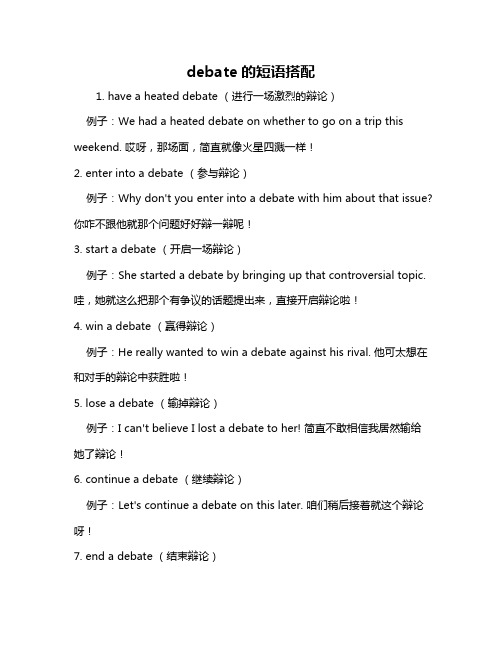
debate的短语搭配1. have a heated debate (进行一场激烈的辩论)例子:We had a heated debate on whether to go on a trip this weekend. 哎呀,那场面,简直就像火星四溅一样!2. enter into a debate (参与辩论)例子:Why don't you enter into a debate with him about that issue? 你咋不跟他就那个问题好好辩一辩呢!3. start a debate (开启一场辩论)例子:She started a debate by bringing up that controversial topic. 哇,她就这么把那个有争议的话题提出来,直接开启辩论啦!4. win a debate (赢得辩论)例子:He really wanted to win a debate against his rival. 他可太想在和对手的辩论中获胜啦!5. lose a debate (输掉辩论)例子:I can't believe I lost a debate to her! 简直不敢相信我居然输给她了辩论!6. continue a debate (继续辩论)例子:Let's continue a debate on this later. 咱们稍后接着就这个辩论呀!7. end a debate (结束辩论)例子:Finally, they decided to end a debate that had gone on for hours. 终于啊,他们决定结束那场已经持续了好几个小时的辩论。
8. avoid a debate (避免辩论)例子:He always tries to avoid a debate with his boss. 他老是试图避免和老板辩论呢!9.引发一场辩论(trigger a debate)例子:That statement triggered a debate among the classmates. 那句话在同学中间引发了一场辩论呀!我的观点结论:Debate 真的是很有趣也很有挑战性呢,可以让我们深入思考问题,还能锻炼口才和思维能力呀!。
Debate 英语辩论赛经典万能句
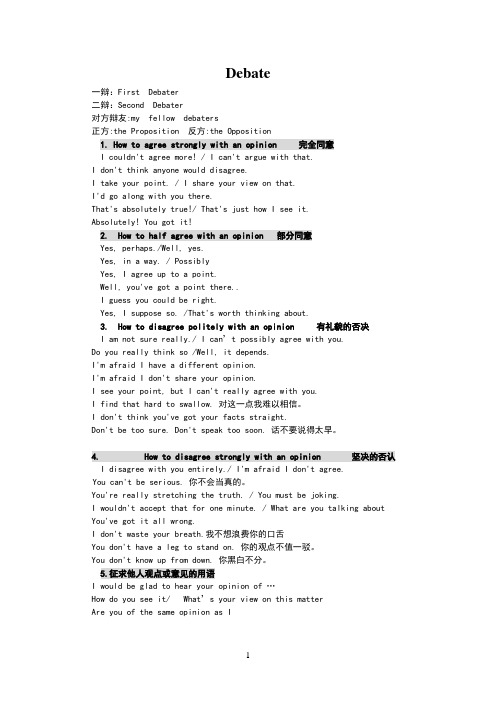
Debate一辩:First Debater二辩:Second Debater对方辩友:my fellow debaters正方:the Proposition 反方:the Opposition1. How to agree strongly with an opinion 完全同意I couldn't agree more! / I can't argue with that.I don't think anyone would disagree.I take your point. / I share your view on that.I'd go along with you there.That's absolutely true!/ That's just how I see it.Absolutely! You got it!2. How to half agree with an opinion 部分同意Yes, perhaps./Well, yes.Yes, in a way. / PossiblyYes, I agree up to a point.Well, you've got a point there..I guess you could be right.Yes, I suppose so. /That's worth thinking about.3. How to disagree politely with an opinion 有礼貌的否决I am not sure really./ I can’t possibly agree with you.Do you really think so /Well, it depends.I'm afraid I have a different opinion.I'm afraid I don't share your opinion.I see your point, but I can't really agree with you.I find that hard to swallow. 对这一点我难以相信。
Useful-Debate-Vocabulary实用英语辩论词汇
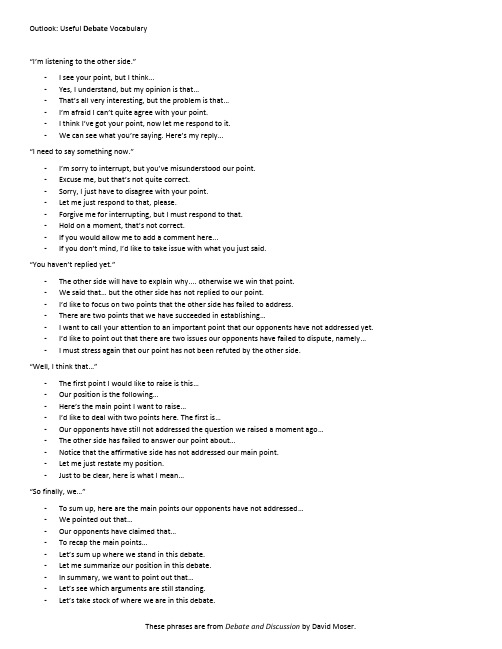
Outlook: Useful Debate Vocabulary“I’m listening to the other side.”-I see your point, but I think…-Yes, I understand, but my opinion is that…-That’s all very interesting, but the problem is that…-I’m afraid I can’t quite agree with your point.-I think I’ve got your point, now let me respond to it.-We can see what you’re saying. Here’s my reply…“I need to say something now.”-I’m sorry to interrupt, but you’ve misunderstood our point.-Excuse me, but that’s not quite correct.-Sorry, I just have to disagree with your point.-Let me just respond to that, please.-Forgive me for interrupting, but I must respond to that.-Hold on a moment, that’s not correct.-If you would allow me to add a comment here...-If you don’t mind, I’d like to take issue with what you just said.“You haven’t replied yet.”-The other side will have to explain why.... otherwise we win that point.-We said that… but the other side has not replied to our point.-I’d like to focus on two points that the other side has failed to address.-There are two points that we have succeeded in establishing…-I want to call your attention to an important point that our opponents have not addressed yet.-I’d like to point out that there are two issues our opponents have failed to dispute, namely…-I must stress again that our point has not been refuted by the other side.“Well, I think that…”-The first point I would like to raise is this…-Our position is the following…-Here’s the main point I want to raise…-I’d like to deal with two points here. The first is…-Our opponents have still not addressed the question we raised a moment ago…-The other side has failed to answer our point about…-Notice that the affirmative side has not addressed our main point.-Let me just restate my position.-Just to be clear, here is what I mean…“So finally, we…”-To sum up, here are the main points our opponents have not addressed…-We pointed out that…-Our opponents have claimed that…-To recap the main points…-Let’s sum up where we stand in this debate.-Let me summarize our position in this debate.-In summary, we want to point out that…-Let’s see which arguments are still standing.-Let’s take stock of where we are in this debate.These phrases are from Debate and Discussion by David Moser.。
辩论的英文单词
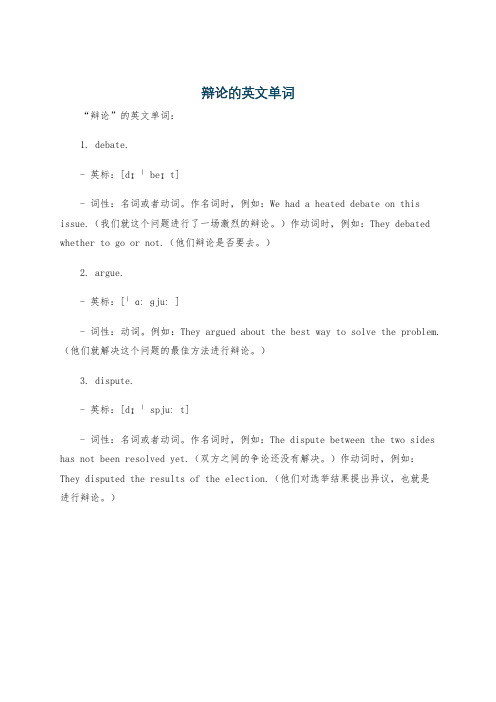
辩论的英文单词
“辩论”的英文单词:
1. debate.
- 英标:[dɪˈbeɪt]
- 词性:名词或者动词。
作名词时,例如:We had a heated debate on this issue.(我们就这个问题进行了一场激烈的辩论。
)作动词时,例如:They debated whether to go or not.(他们辩论是否要去。
)
2. argue.
- 英标:[ˈɑːɡjuː]
- 词性:动词。
例如:They argued about the best way to solve the problem.(他们就解决这个问题的最佳方法进行辩论。
)
3. dispute.
- 英标:[dɪˈspjuːt]
- 词性:名词或者动词。
作名词时,例如:The dispute between the two sides has not been resolved yet.(双方之间的争论还没有解决。
)作动词时,例如:They disputed the results of the election.(他们对选举结果提出异议,也就是进行辩论。
)。
辩论争论英语

辩论争论英语Debate is a formal discussion where participants present arguments for and against a particular topic. It is a way to explore different perspectives and reach a better understanding of the issue at hand. Whether in academic settings, politics, or casual conversations, debates are essential for critical thinking, decision-making, and personal growth.Firstly, debates encourage the development of critical thinking skills. Engaging in a debate requires careful analysis of arguments, evidence, and counterarguments. Participants must evaluate the validity and logic of statements, strengthen their own rationale, and counter opposing viewpoints. Through this process, debaters learn to think critically, identify faulty reasoning, and develop informed opinions.Secondly, debates provide a platform for discussion and engagement with different viewpoints. By actively listening to opposing arguments, debaters are exposed to diverse perspectives and ideas. This fosters a greater understanding of different opinions, cultures, and backgrounds. Debates promote empathy, as participants must consider the feelings and experiences of others, even when disagreeing with them. Additionally, through constructive dialogue, individuals can find common ground and bridge gaps between conflicting positions.Moreover, debates stimulate personal growth and intellectual curiosity. Engaging in spirited discussions forces individuals to assess their beliefs, values, and biases. It challenges them to expand their knowledge, research various sources, and developwell-rounded arguments. The process of defending one's position fosters confidence, public speaking skills, and the ability to convey ideas effectively.Furthermore, debates contribute to informed decision-making. By examining different arguments and counterarguments, debaters gain a comprehensive understanding of the topic. They become more informed, knowledgeable, and able to make well-reasoned decisions. This is crucial in areas such as politics, law, and policy-making, where choices can have far-reaching consequences.In conclusion, debates are crucial in fostering critical thinking skills, promoting empathy and understanding, stimulating personal growth, and aiding decision-making. By providing a platform for diverse perspectives and rigorous intellectual engagement, debates contribute to a more informed and democratic society. It is through respectful discourse and active participation that we can collectively reach better solutions and progress as a society.。
debate英语辩论非常实用哟
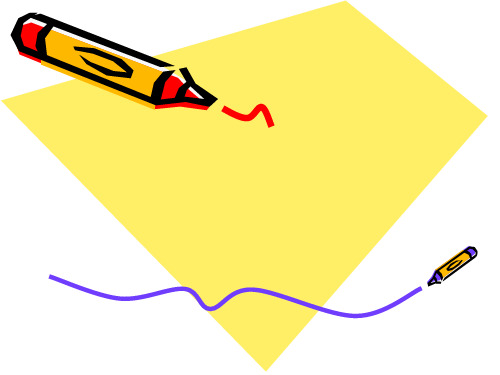
Preparing for a debate, you should learn … • to use a library, and to find the exact information you need in the shortest possible time. • to be thorough and accurate. • to analyze, to distinguish between the vital and the unimportant. • to learn the need of proving your statements; of supporting every statement with valid evidence and sound reasoning
•
How to Construct Effective Arguments
Language
• • • • • • Accurate pronunciation Articulation Diverse pace and pitch Vocabulary. Avoid speaking too quickly. Try to avoid being too nervous
• to demand the same sort of proof for the statements of others. • to present ideas in a clear and effective manner, and in a way, which wins others to your way of thinking. • to think under pressure, to “use his head” in a time of need, to make decisions quickly and accurately.
debate是什么意思用法
debate是什么意思用法debate既能做动词,也能表达名词的意思,那么你知道debate 表达都有什么意思吗?下面店铺为大家带来debate的英语意思和相关用法,供大家参考学习!debate作名词的意思辩论;辩论;争论;讨论debate作动词的意思辩论;仔细考虑;思考;盘算debate的英语音标英 [diˈbeit]美 [dɪˈbet]debate的用法debate用作名词可指在公共集会或议会中进行的正式“辩论,讨论”,也可指一般性的“辩论,讨论”。
debate的英语例句1. There needs to be a properly informed public debate.有必要让公众在充分知情的状况下展开辩论。
2. His comments are bound to add fuel to the debate.他的话必将为争论推波助澜。
3. A full-scale debate is under way on what ails the industry.关于工业为何陷入困境正在展开一场全面的讨论。
4. There is a debate about his fitness for the highest office.针对他是否能胜任最高职务展开了争论。
5. To add spice to the debate, they disagreed about method and ideology.他们在方法和观念上都持不同意见,这使辩论精彩了很多。
6. Meanwhile, the domestic debate on Denmark's future role in Europe rages on.与此同时,国内也展开了有关丹麦未来在欧洲扮演何种角色的激烈争论。
7. Surely such weighty matters merit a higher level of debate?这样重大的事件谅必应进行更高级别的讨论吧?8. The case of Harris has sharpened the debate over capital punishment.哈里斯案激化了人们对死刑的争论。
English Debate 英语辩论赛常用语
Concluding the points of the other side debater As you said… 像你所说的那样…… But haven’t you said that…? 但是, 难道你没说过……吗?、 If I understood you correctly, you said that… 要是我理解正确的话,你 说过…….
. Coming up with a new point Another point is that … 另一点是…… Another way of looking at it is … 看 这个问题的另一个看法是…… I forgot to say / tell you that… 我忘 记要讲…...
How to Agree Strongly with an Opinion. 1. I couldn't agree more! 2. That's absolutely true! 3 .Absolutely! 4. I agree with your point. 5. I'd go along with you there. 6. I'm with you on that. 7. That's just what I was thinking. 8. That's exactly what I think. 9. That's a good point. 10. That's just how I see it. 11. That's exactly my opinion. 12.That‘s a good point.这个看法不错 I feel the same way.我也持同样的想法。
争论辩论英文单词
争论辩论英文单词一、单词:debate1. 单词释义- 作名词时,debate表示正式的辩论、讨论,通常是在公众场合或者有组织的情况下,人们就某个议题提出不同观点并进行论证。
例如,在政治、学术等领域的辩论。
作动词时,意思是对某个问题进行辩论、争论,也就是双方或多方交换意见并试图说服对方。
2. 单词用法- 作名词:“We had a heated debate on the new education policy.”(我们就新的教育政策进行了一场激烈的辩论。
)- 作动词:“They will debate the issue tomorrow.”(他们明天将辩论这个问题。
)可以用于主动语态,也可用于被动语态,如“The issue was debated thoroughly.”(这个问题被彻底地辩论了。
)3. 近义词- argument:更强调个人之间的争吵,可能带有情绪因素,而debate相对更正式。
例如:“Their argument was just a waste of time, but a debate can lead to new ideas.”(他们的争吵只是浪费时间,但一场辩论能催生新的想法。
)- discussion:讨论的范围更广,不一定有明确的对立观点,而debate侧重于不同观点的交锋。
例如:“A discussion can be casual, but a debate is more structured.”(讨论可以很随意,但辩论更有条理。
)4. 短语搭配- debate on/over/about:表示关于……的辩论,如“debate on environmental protection”(关于环境保护的辩论)。
- open a debate:开启一场辩论,例如:“He opened a debate on the future of the city.”(他开启了一场关于城市未来的辩论。
高二英文An Interesting Debate-一场有趣的辩论英语作文
An Interesting Debate-一场有趣的辩论英语作文TodayisSunday.AftersupperfathermotherandIwenttothepardk.Isatontheb ackoffather\'sbike.Afterawhilefathersaid"Girlyoushouldloseweight."Moth eragreedwithfather.ButIthoughtitwasn\'tbadforme.SoIsaid"NoIdon\'twa ntto.Iliketobemyself.DoyouknowthefamousactressnamedFeiFeiinHongKo ng?Sheisveryfatbutverypopularwiththeaudience.""Butfewfatpeoplecanb ecomefamous"fatherdidn\'tagreewithme.Andmothercontinued"Youkno walotofillnessesarecausedbyobesitysuchasheartdiseasehypertensionand soon."ItseemedIhadtwoopponents.Ishouldtrymybesttodefeatthem.SoIquibbled "There\'snothingtobeworriedabout.Anywaythemedicaltechnologyhasbe endevelopedsoadvanced."AndthenIdirectedthespearheadatmother"You arealsosofat.Whydon\'tyouwanttoloseweight\'?"Mothersighed"Idowantt o.Butit\'snotgoodformetodoso.I\'minmyfortieswhileyouaresoyoung.Ifyo ucandomoreexercisesandcontrolyourdietyou\'lleasilyloseweight.""Noyou \'rerong.Isaidloudly."Someexpertssaythatexercisescan\'thelppeoplelose weightbecausetheywilleatmoreaftertheexercise." Fatherandmotherlookedateachotheranddidn\'tknow\'whattosay.Iwonthe debate!IstoppedlaughingwhenIheardfathersaying"Fatdaughterpleaseget offmybike."Ohno!一场有趣的辩论今天是星期天。
- 1、下载文档前请自行甄别文档内容的完整性,平台不提供额外的编辑、内容补充、找答案等附加服务。
- 2、"仅部分预览"的文档,不可在线预览部分如存在完整性等问题,可反馈申请退款(可完整预览的文档不适用该条件!)。
- 3、如文档侵犯您的权益,请联系客服反馈,我们会尽快为您处理(人工客服工作时间:9:00-18:30)。
• Doubtful authority
An argument supported by a person who is not accepted as an expert is considered ineffective. Here is one example:
Let us consider the questions of sport. My Dad told me that the America’s Cup is organized for millionaires, and funded by the money the Australians pay us to lose to them in all sports.
• Supporting materials can be examples. Your arguments can also be backed up with other supporting materials, like reasons, statistics, and even with anecdotes, idioms, proverbs, quotations and analogies.
• to demand the same sort of proof for the statements of others.
• to present ideas in a clear and effective manner, and in a way, which wins others to your way of thinking.
and attack on that basis • Organize your arguments effectively.
Avoid fallacies in arguments
• Making effective and logical arguments is the most effective key to success in a debate.
English For Debate
What is a Debate?
• A debate is a form of argument. It contains two teams arguing opposite sides of a “proposition” in an orderly manner, following the agreed upon rules.
in front of other people.
Refute arguments
• Refutation is the process of proving that an argument or a series of arguments, or the conclusions drawn from that argument or arguments, is false, erroneous, or at least doubtful. In a debate, effective refutations are key to success. Refutation should be handled systematically.
• The most important aspect of debating is that assertions must be justified. No one can be convinced or persuaded of anything if they are given no reason for doing so. That is to say you should use materials to support your arguments.
• The team that agrees with the topic is called the affirmative and the team that disagrees with the topic is called the negative.
• Teams argue their proposition using reasoning and evidence.
To be a good debater, you need…
• the confidence to speak in public. • the ability to present an argument persuasively. • the vision to understand that there are two sides to
Eye contact Voice
Body language
Remember…
Confidence is vital in debate. Your presentation, speech, and appearance matter almost as much as your delivery and your content.
most arguments. • the respect for others, to let them have their say. • the sense of timing, to prioritize your material and
speak in a given time period.
• An argument is a statement “The topic is true or false( depending on which side you are on) because of x”, where the argument fills in for the x.
• For example in the topic “That the zoos should be closed” an argument may be: “the zoos should be closed because they confine the animals in an unnatural environment”.
Delivery
• Cue cards
Do not write out all your speech on cue cards. Debating is an exercise in lively interaction between two teams and between the audiences, not in reading a speech. The audience can tell when you are reading. Use cue cards the same way you would use a prompt(提示词) in a play. They are there for reference if you lose your spot.
For example, "Listen ! I love New Zealand. I love the All Blacks, the Tall Ferns. We should get down on our knees and thank the sporting gods for them…”
• to be thorough and accurate. • to analyze, to distinguish between the vital and the
unimportant. • to learn the need of proving your statements; of
supporting every statement with valid evidence and sound reasoning
So…
• Dress appropriately • Have notes prepared. You do not want your debate to
be an oral presentation of a written essay. • Practice speaking aloud in front of a mirror and then
• the structure to order your thoughts, to introduce, develop and summarize your points.
• the general and specific knowledge of many current affairs topics, learnt through research and debate.
Guidelines to follow
• Anticipate what your opponent will say. • Take careful notes of what your opponent says
and note your reactions to what is said. • Find your opponents' fallacies in arguments
• become more adept at developing and putting forward ideas
• learn to think quickly • learn to work as a team • develop leadership skills • develop speaking and listening skills.
• the flexibility to react quickly to new ideas, and to remain unflustered in crises.
Preparing for a debate, you should learn …
